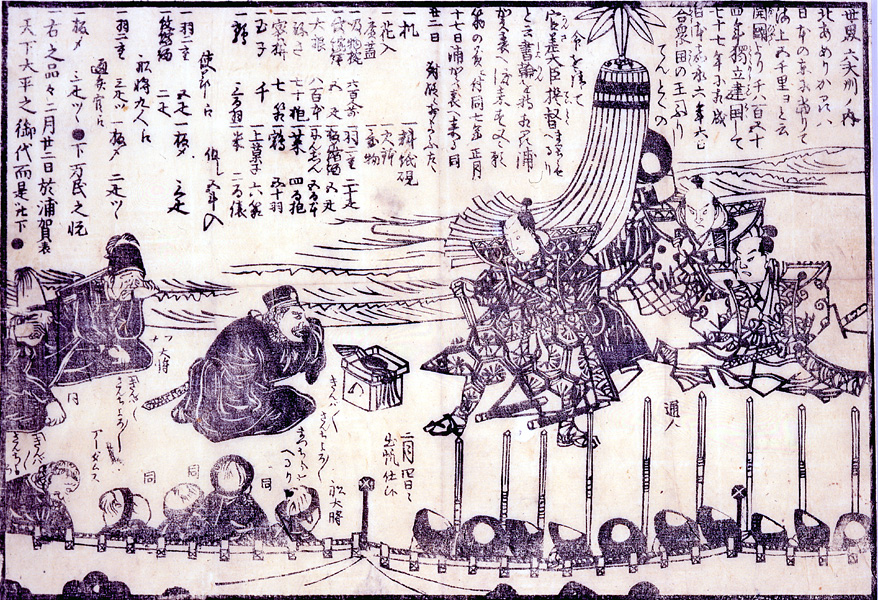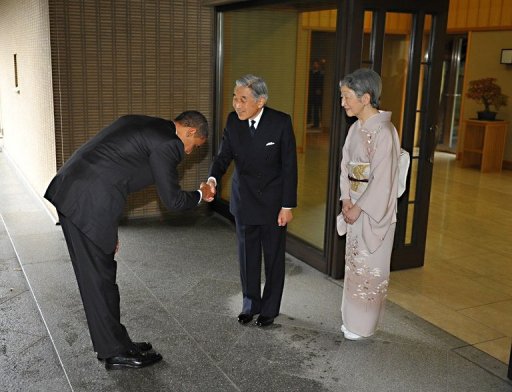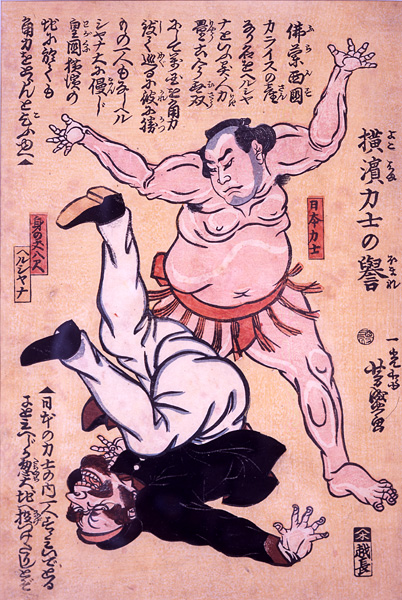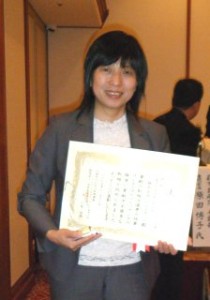Roland Kelts Daily Yomiuri column: Soft power evolution from Perry’s day to Obama’s
*************
http://www.yomiuri.co.jp/dy/features/arts/20091120TDY13001.htm
FYI, images below are 1) Commodore Perry’s bow, 2) Obama’s bow and 3) Political commentary from Perry’s day.

*****
 ******
******

WIT Life #57: Teleworking in Japan
WITLife is a periodic series written by professional Translator/Interpreter/Writer Stacy Smith (Kumamoto-ken, 2000-03). Recently she’s been watching Fujisankei’s newscast in Japanese and sharing some of the interesting tidbits and trends together with her own observations.
My only time traveling one-on-one as an interpreter for the Department of State’s International Visitor Leadership Program was a year ago with a female entrepreneur from Hokkaido named Yuri Tazawa. No one epitomizes the “Yes We Can” spirit more than Yuri, so it was appropriate that we were able to celebrate Obama’s victory together while in DC. She began a company in a town called Kitami 11 years ago after being raised in Nara, going to university in Tokyo, and starting a family. You might wonder what kind of business one could have being located so far away from a metropolis, but Yuri heads a company called Y’s Staff (taking the Y from her name as well as being a homonym with “wise”).
Y’s has offices in both Hokkaido and Nara, but its actual structure is virtual. Through her company, Yuri is a promoter of teleworking. This concept is often confused with telemarketing, but is essentially the idea of doing work in a place other than a fixed office. This could be your home, the local Starbucks or any other location. Yuri also advocates Read More
WIT Life #56: Talk Like Singing
WITLife is a periodic series written by professional Translator/Interpreter/Writer Stacy Smith (Kumamoto-ken, 20 00-03). Recently she’s been watching Fujisankei’s newscast in Japanese and sharing some of the interesting tidbits and trends together with her own obser vations.
vations.
Last night I attended the world premiere of Talk Like Singing, the first-ever original Japanese musical to premiere in the U.S. I had high hopes for this production due to the involvement of several big names in Japan. The star of the show, Shingo Katori, is a member of the ubiquitous boy band SMAP, and though he is less well-known than heartthrob Kimutaku or recently headline-making Kusanagi he holds his own thanks to his eccentricity. Back in my JET days, he adopted the persona of “Shingo Mama,” and sang of his cooking skills, eating breakfast together and properly greeting everyone with a genki “oha!” This abbreviation for ohayou or “good morning” and its accompanying hand motion became all the rage at the workplace and beyond.
This song was composed by Yasuharu Konishi, who is in charge of the show’s music and musical direction. He was Read More
Roland Kelts quoted in Vanity Fair article on “super-cuteness”
***************
A story just published in the new December issue of VANITY FAIR chronicles the way Japanese kawaii, or super-cuteness, has conquered America: http://www.vanityfair.com/culture/features/2009/12/cuteness-200912
Roland Kelts (Osaka-shi, 1998-99), author of Japanamerica, is quoted fairly liberally via an interview with Vanity Fair writer Jim Windolf. Here’s a sample:
“There’s no doubt that cuteness has been a part of the Japanese aesthetic since the postwar years,” says Roland Kelts, the author of the 2006 book Japanamerica: How Japanese Pop Culture Has Invaded the U.S. “One theory, which has been proposed by a lot of Japanese artists and academics, is that, after the humiliation and emasculation of Japan in the postwar years, Japan developed this quasi-queer position of ‘little brother’ or ‘little boy.’ If you become ‘little brother’ or ‘little boy,’ the only way you can get big brother’s or fat man’s attention is by being so cute or puppy-like that he has to take care of you.”
Roland also recently returned to Japan from a book promotion tour in Korea.
WIT Life #55: 侍への憧れ
WITLife is a periodic series written by professional Translator/Interpreter/Writer Stacy Smith (Kumamoto-ken, 2000-03). Recently she’s been watching Fujisankei’s newscast in Japanese and sharing some of the interesting tidbits and trends together w ith her own observations.
ith her own observations.
Last night I attended the North American premiere of Goemon, a movie portraying this titular folk hero who was known as the Robin Hood of Japan. It takes place during the Warring States period, and some prominent historical figures who appear are Oda Nobunaga, Toyotomi Hideyoshi and Tokugawa Ieyasu. It is interesting to see Eguchi Yosuke, usually seen in lighter fare such as dramas, as the title character of legendary ninja bandit Ishikawa Goemon. Hirosue Ryoko, another drama veteran, is featured in the role of Princess Chacha whom Goemon spent his early years protecting. The movie’s plot is almost entirely fictional, and displays many dazzling special effects in a CGI-enhanced fantasy setting. The director, Kiriya Kazuaki, hails from my JET hometown of Kumamoto and is the former husband of Utada Hikaru.
During the course of the film, Goemon’s attendant talks of his aspirations to become a samurai and steadily working his way up to achieve this recognition. As the title of this post (samurai e no agokare or “longing for samurai“) suggests, the appeal of samurai has not been lost in this modern day and age. Recently various media have been Read More
 WITLife is a periodic series written by professional Interpreter/Translator/Writer Stacy Smith (Kumamoto-ken, 2000-03). Recently she’s been watching Fujisankei’s newscast in Japanese and sharing some of the interesting tidbits and trends togeth
WITLife is a periodic series written by professional Interpreter/Translator/Writer Stacy Smith (Kumamoto-ken, 2000-03). Recently she’s been watching Fujisankei’s newscast in Japanese and sharing some of the interesting tidbits and trends togeth er with her own observations.
er with her own observations.
Last night I was able to attend a private screening of the intriguing documentary Samurai Umpires in the U.S.A. Executive producer/director Takayuki Tanaka is a Japanese native who conceptualized the idea for his film while studying at the New York Film Academy. His work focuses on six Japanese baseball umpires working in the minor leagues with dreams of making it to the Majors.
This all-male group ranges in age and umpiring experience, and the movie delves into Read More
Roland Kelts on Japanese pop music in Daily Yomiuri column
 Roland Kelts (Osaka-shi, 1998-99), author of Japanamerica, has another SOFT POWER/HARD TRUTHS column in The Daily Yomiuri (and also re-printed in 3:AM Magazine) about J-Pop music in America, featuring interviews with Miho Hatori, formerly of Cibo Mato, and Reni-chan, a recent NYC transplant from Tokyo, plus reflections on AKB48.
Roland Kelts (Osaka-shi, 1998-99), author of Japanamerica, has another SOFT POWER/HARD TRUTHS column in The Daily Yomiuri (and also re-printed in 3:AM Magazine) about J-Pop music in America, featuring interviews with Miho Hatori, formerly of Cibo Mato, and Reni-chan, a recent NYC transplant from Tokyo, plus reflections on AKB48.
- Daily Yomiuri SOFT POWER/HARD TRUTHS: Japan’s Music Makers in America
- Link to 3:AM Magazine post of the column: http://www.3ammagazine.com/3am/3am-asia-soft-power-hard-truths-japans-music-makers-in-america/
Japan National Tourist Organization (JNTO) Japan Travel Journal Cafe Vol. 6
 |
|
| Vol.6 2009 Oct. | |
|
|
|
|
WITLife is a periodic series written by professional Interpreter/Translator/Writer Stacy Smith (Kumamoto-ken, 2000-03). Recently she’s been watching Fujisankei’s newscast in Japanese and sharing some of the interesting tidbits and trends together with her own observations.
Last night at Japan Society I had the chance to catch a sneak preview of the American movie version of the Japanese manga series “Testuwan Atomu,” known here in the States as Astro Boy. This wide-eyed, spiky haired superhero has a huge following both here and at home, and his Hollywood debut was greatly anticipated. Though I had never seen the original series, which based on a manga became an anime first in Japan and then here in 1963, I truly enjoyed the Western interpretation of the life of this legendary icon.
known here in the States as Astro Boy. This wide-eyed, spiky haired superhero has a huge following both here and at home, and his Hollywood debut was greatly anticipated. Though I had never seen the original series, which based on a manga became an anime first in Japan and then here in 1963, I truly enjoyed the Western interpretation of the life of this legendary icon.
The voices were provided by a star-studded cast including Read More
“Two Authors Send Readers on Mysterious Journeys Through Japan:”Chin Music Press Book Reading at Capitola Book Café- Oct 20 (Santa Cruz, CA)
Chin Music Press, the Seattle-based publisher owned and run by Bruce Rutledge (MEF Program Chiba-ken, 1985-87) is headed to Northern California as author Todd Shimoda reads from his latest novel, Oh! A mystery of mono no aware, at the Capitola Book Café (1475 41st Avenue in Capitola) on Tuesday, October 20th at 7:30pm. Shimoda joins anthropologist and writer Liza Dalby, who will be reading from Hidden Buddhas: A Novel of Karma and Chaos. This event is free to the public.
The Capitola Book Café hosts Shimoda and Dalby under the title of “Mysterious Journeys Through Japan” with discussion of their usage of Japan as a setting for emotional paths towards moments of enlightenment. Here’s a blurb about both books from the event webpage:
Oh! by Todd Shimoda was selected as an NPR Summer Reading pick and combines visual artistry with patient and brilliant storytelling. Zack Hara is a technical writer trudging through life in LA until he leaves everything to travel to Japan. There, searching for an emotional life, Zack becomes entwined with a tragic poet, a sensual but disillusioned woman, and young people form suicide clubs— all propelling him down a dangerous path. “A triumphant kick in the pants for anyone who doubts the future of paper-and-ink books.” — Lucia Silva
Liza Dalby returns to Book Café with a novel that Arthur Golden, author of Memoirs of A Geisha, describes as “…(her) best work yet; with its fascinating story of characters caught up in a world they themselves don’t understand.” Hidden Buddhas explores the karmic connections between Japanese fashion, pilgrimage, dying honeybees, murder by blowfish, and the Buddhist apocalypse. Something of a Buddhist Da Vinci Code, Dalby’s stunning new novel travels to the unknown corners of Japan and through time to expose a mystery you will never forget!
Check out previous JetWit posts about Bruce Rutledge here and a Japan Times review of Oh! here.
On a related note, Bruce is joined at Chin Music Press by two other JET alums: designer Joshua Powell (Saitama-ken, 2005-07) and PR intern Jessica Sattell (Fukuoka-ken, 2007-08).
WIT Life #52: Manifesto Woes
WITLife is a periodic series written by professional Interpreter/Translator/Writer Stacy Smith (Kumamoto-ken, 2000-03). Recently she’s been watching Fujisankei’s newscast in Japanese and sharing some of the interesting tidbits and trends together with her own observations.

The Manifesto is the imposing name of the Democratic Party of Japan (DPJ)’s platform for its new government, one that promises to “put people’s lives first.” In order to accomplish this, its five pledges are the end of wasteful spending, childrearing and education, pension and medical care, regional sovereignty and employment and the economy. Although great in theory, new Prime Minister Yukio Hatoyama is realizing that these goals are easier to state than actually carry out. Japanese ministries and agencies asked to spend a record 95.04 trillion yen ($1 trillion) next fiscal year, risking expansion of the world’s largest public debt.
This creates the issue of whether the DPJ can fulfill its election pledges without worsening an already significant debt burden. In response to this, Fujisankai carried out Read More
WITLife is a periodic series written by professional Interpreter/Translator/Writer Stacy Smith (Kumamoto-ken, 2000-03). Recently she’s been watching Fujisankei’s newscast in Japanese and sharing some of the interesting tidbits and trends togethe r with her own observations.
r with her own observations.
Time.com featured an interesting article today about how ANA is encouraging its customers to utilize restroom facilities before coming on board in an effort to reduce its carbon footprint. With lighter loads, planes would have reduced fuel consumption and therefore less impact on the environment. A great idea in theory, but as the article mentioned questionable as to how successful it will be in practice. Also, interestingly enough the pre-flight announcement with the request is only in Japanese, so those who do not speak the language might not know what is being asked.
Reading about this endeavor got me thinking about how my own attitude toward the environment and my habits subsequently changed as a result of my time living in Japan. I remember one of the first things that surprised me Read More
 WITLife is a periodic series written by professional Interpreter/Translator/Writer Stacy Smith (Kumamoto-ken, 2000-03). Recently she’s been watching Fujisankei’s newscast in Japanese and sharing some of the interesting tidbits and trends together with her own observations.
WITLife is a periodic series written by professional Interpreter/Translator/Writer Stacy Smith (Kumamoto-ken, 2000-03). Recently she’s been watching Fujisankei’s newscast in Japanese and sharing some of the interesting tidbits and trends together with her own observations.
Big news for expecting parents. Going into effect today in Japan (October 1), child care costs will be borne directly by hospitals. Previously pregnant women would have to pay the one-time delivery/child rearing costs up front and later received 380,000 yen back, but now it will be directly paid by the hospitals at a 40,000 yen increase of 420,000 yen . This was initially proposed in Read More
Roland Kelts column in Daily Yomiuri and appearances at the NY Anime Festival this weekend
 ****************
****************Here’s the latest Daily Yomiuri column from Roland Kelts (Osaka-shi, 1998-99), author of Japanamerica, from his “Soft Power, Hard Truths” series for the Daily Yomiuri. This one about the giant robot Gundam and AKB48 girl-power at this year’s New York Anime Festival, kicking off tomorrow:
http://www.yomiuri.co.jp/dy/features/arts/20090925TDY13001.htm
Also, Roland will be at the New York Anime Festival at the Javits Center all weekend and says to JET alums, “Please swing by and say hello if you can.” Here’s his schedule for the weekend:
- Friday, 5:15 to 6:15 pm — Yoshiyuki Tomino (GUNDAM)
- Saturday, 12:15 to 1:15 pm — AKB48
- Sunday, 11:15 am to 12:15 pm — Yui Makino
***********
 Thanks to a tweet from Roland Kelts (Osaka-shi, 1998-99), I just read the news that Yoshito Usui, the creator of Crayon Shinchan, died after falling off of a cliff. Apparently he was taking photos in Nagano and must have slipped.
Thanks to a tweet from Roland Kelts (Osaka-shi, 1998-99), I just read the news that Yoshito Usui, the creator of Crayon Shinchan, died after falling off of a cliff. Apparently he was taking photos in Nagano and must have slipped.
Here’s the article: http://search.japantimes.co.jp/cgi-bin/nn20090922a2.html
This is very sad news. I learned Japanese thanks to Crayon Shinchan. No joke. When I went on JET, I subscribed to Manga-Jin, a now defunct magazine that would do line-by-line explanations of manga. It was studying from an issue of Manga-Jin one day that introduced me to Crayon Shinchan.
I was hooked, and I proceeded to buy ever new Crayon Shinchan book I could find. The relatively simple language combined with use of furigana plus the appealingly crude humor that also inadvertently explained a lot of Japanese social dynamics was exactly what I was seeking in those pre-Internet days of JET.
The news of Usui’s death reminded me that I had a sort of fantasy (long since forgotten) where I would track down Usui-san and thank him and let him know how influential he was in my Japanese language study.
Well, that opportunity no longer exists. But if anyone else wants to share any thoughts or memories about their experience with Crayon Shinchan, feel free to post below.



